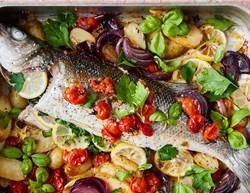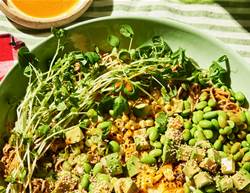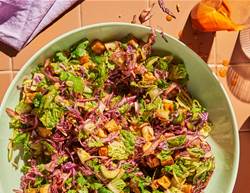This Curry-Avocado Crispy Egg Toast recipe upgrades the breakfast classic with lime, coriander, and flavour-packed curry powder.
It's also Mediterranean diet friendly. By now, you probably know just how great the Mediterranean diet is. It consistently ranks among the top diets to follow—perhaps because instead of outlining strict calorie or carb requirements, it’s centered on picking filling, nutritious options. Research has shown that following the diet can lower the risk of heart attacks, strokes, and heart failure, and it might even prolong your life.
But the best part of the Mediterranean diet might be that it allows indulgence: Favourites like eggs, olive oil, and fresh fruits and veggies are all fair game for breakfast. (Can you imagine a better breakfast spread?) Here are the basics of the Mediterranean diet, plus tips and tricks for sticking to it each morning.
What is the Mediterranean diet?
Unlike other diets, which can dictate which types of foods aren’t allowed, this diet is really more a way of life.
“The Mediterranean diet is almost rich in everything,” says Keri Gans, M.S., R.D., a New York-based nutrition consultant and author of The Small Change Diet. “We talk about it as a special diet, but it’s basically well-balanced, healthy eating where all foods fit.”
In the Mediterranean diet, certain foods are emphasised and others are limited (but not cut out entirely). Fruits and veggies, legumes, nuts and seeds, seafood, whole grains, olive oil, low-fat dairy, poultry, and eggs are the staples of the diet, Gans says.
Limited foods, meanwhile, are the ones that you should probably be avoiding anyway: refined grains and oils, red meat, processed foods, and foods with added sugar. “Red meat, [for example,] isn’t avoided,” Gans explains. “Just eat more fish, poultry, and legumes, and gear your meals more plant-based. Focus less on the saturated fats.”
By loading up on the foods listed above, you’ll get tons of nutrients at every meal. “The Mediterranean diet is rich in omega-3 fatty acids, antioxidants, fibre, and monounsaturated fats—those are the healthy fats, the nuts, the seeds, the olive oil,” Gans explains. These nutrients may play important roles in reducing the risk of heart disease and certain cancers, “one of the biggest benefits” of the diet, according to Gans.
How to build a healthy Mediterranean breakfast
With the right combination of protein, fibre, and carbs—which you’ll get from all of the staple foods in the diet—Gans says, Mediterranean breakfasts will also keep you feeling full, satisfied, and attentive until lunch.
“What’s beautiful about the Mediterranean diet is that you don’t need any fancy formulas, you don’t need any math skills [to count calories],” Gans says. “It’s just common sense.”
Is your stomach growling yet? Try this recipe for Curry-Avocado Crispy Egg Toast.
Curry-Avocado Crispy Egg Toast
Ingredients
5 tbsp olive oil
2 large eggs
2 slices bread
1/2 tsp curry powder
1 avocado
2 tsp lime juice
1/8 tsp salt
Chopped coriander for garnish
Directions
Crack 1 egg into each of 2 small cups. In 10-inch nonstick skillet, heat 3 tablespoons olive oil on medium-high until very hot. Carefully add eggs; stand back, as oil will sputter. Cook until whites are golden brown and crisp around edges and set around yolks, 2 minutes. If edges are dark but whites are not set, remove frying pan from heat; cover 10 seconds or until whites are cooked. Season with pinch salt and pepper.
In small dry skillet on medium, toast curry powder until fragrant, 1 minute. Stir into 2 tablespoons olive oil and set aside. Mash avocado with lime juice and salt. Toast 2 slices of bread. Top each with avocado mash, 1 crispy egg and chopped cilantro. Drizzle with curry oil.
_(1).jpg&h=630&w=1120&c=1&s=1)








